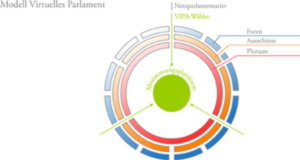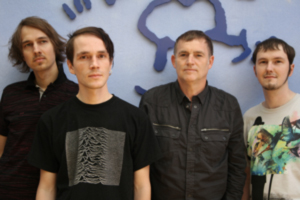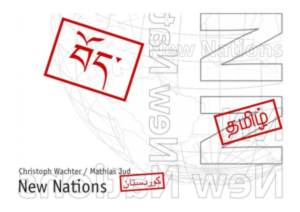 1st VIPA-Congress
1st VIPA-Congress
The first VIPA-Congress on the internet platform virtuellesparlament.de addresses the current negotiations and talks about future potentials of a web-based democracy. The platform will serve as panel for political discussions and opinion-polling in support of
a political culture of the 21st century. It will furthermore provide political information and help generate decisions, exploring the scope of an open parliamentarian process. The first VIPA-Congress will offer opportunities for a direct exchange of experiences and perspectives of net-based participation as well as chances and limits of a trans-local web-based democracy.
to mark the 90th anniversary of the Weimar constitution
The revolution on the net – trans-local web-based politics as an element of democratic culture and education of the 21st century
dates
Fri, Dec 4th, 09:00 PM (opening speech)
Sat, Dec 5th, 11:00 AM to 06:00 PM
Sun, Dec 6th, 11:00 Am to 03:00 PM
 Currently there are various types of web-based, trans-local democracy coming to the fore. This
Currently there are various types of web-based, trans-local democracy coming to the fore. Thisis happening with enormous speed. Committed and skilled citizen users are in the process of establishing themselves likewise as producers, recipients and cooperative entities of political communication and opinion making. The election campaign of Barack Obama has shown how
new ways of web-based political participation contribute to the mobilisation and networking of people. Virtuelles Parlament (VIPA) which will be presented within the congress, is an internet
forum that serves as independent generator of political information and decision-making - in
support of a political culture of the 21st century. The platform www.virtuellesparlament.de
(prototype) went online on 11th August 2009 on the occasion of the 90th anniversary of the
signing of the Weimar constitution.
 The idea of a web-based discussion and decision-making panel will yield consequences for our democracy and go beyond the political participation of representatives and spectators. The co- operative development of the software Linux or the collective electronic encyclopaedia Wikipedia,
The idea of a web-based discussion and decision-making panel will yield consequences for our democracy and go beyond the political participation of representatives and spectators. The co- operative development of the software Linux or the collective electronic encyclopaedia Wikipedia,as well as the potential of “Social Software“ and “Social Networking“ which are concomitant to
the so-called web 2.0 can essentially be seen as elements of new types of communication and polling. This is true despite the dependence on network monopolies and tendencies of “fragmentation” (Jürgen Habermas).
The new political communication will be based on the social exchange of information, skills and experience with a personal motivation instead of the quest for egomania, hyper-presence, manipulation and profit. This leads to the question, if and how new “ground rules” for web-based
democracy will establish in connection with a qualified and wide participation on a local, regional, national and international level. How will this affect or change the real politics?
Interested parties will have the opportunity to communicate directly on opportunities and limitations of a direct web-based democracy at the first VIPA-Congress which will take place as part of the CYNETART event at the Festspielhaus Hellerau.
Topics for dicussion:
– virtual parliament: trans-local web-based democracy that goes beyond parliamentarism?!
– web-based politics: generation instead of fragmentation
– members of Parliament on the web: participation, collaboration, responsibilities
– doing political work in public?!: transparency versus data protection
– new political identities: trans-local republics and nations
– open construction site: requirements for a political software
– safety and freedom: risks of web-based politics
– Barack Obama as example for campaigning on the internet
Production team/editors of 1st VIPA-Congress:
Dr. Klaus Nicolai (concept idea, production manager)
Sebastian Drichelt (design), Sven Dämmig (net-engineering), Steffen Hönig (social media expert), Thomas Dumke (project manager of CYNETART) Kerstin Westphal (organisation), Julia Rülicke (public relations), Vanessa Di Leonardo and Jadwiga Müller (editorial assistants)
VIPA Editorial committee:
Prof. Dr. Werner J. Patzelt
Technical University Dresden
Chair for political systems and system comparisons
(subject to alterations!)
New Nations – a new dimension of internet for Tibetans et al || art Installation
 Christoph Wachter, Mathias Jud || Förderpreis der Kunstministerin
Christoph Wachter, Mathias Jud || Förderpreis der KunstministerinDates
Fri, Dec 4th, 09:00 PM to 11:00 PM
Sat, Dec 5th, 10:00 AM to 11:00 PM
Sun, Dec 6th, 11:00 AM to 06:00 PM
Credits
Förderpreis der Kunstministerin;
Eidgenössisches Departement des Innern EDI, Bundesamt für Kultur BAK
The world wide web appears as an open space. But there are state authorities acting behind the globalisation: an American network (.gov .mil .com) has been extended by national domains (.de .fr .ch). This division of the digital data network marginalises humans, who are oppressed in terms of eviction and censorship. Control by the established nations makes it impossible for unrecognised communities to articulate, legitimise and finally also to legalise themselves. In refugee countries and commercialised communication systems they will remain an off-line issue or sub-culture. “New Nations” add a new dimensions to the existing internet by providing Tibetans, Kurds, Tamils, Uigurs, Sahrauis etc with their own internet domain. This community project facilitates a new culture of open and global communication.
